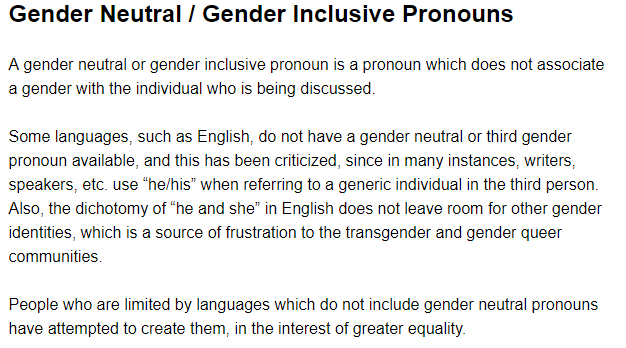Editor’s Note: In the past year, IJFAB Blog has featured several blog entries on shifting pronoun usage not only in the English language but in the International Journal of Feminist Approaches to Bioethics itself. IJFAB Editor Jackie Leach Scully brings us this reflection on IJFAB’s revised pronoun policy. Several authors have battled with IJFAB copy editors over pronoun usage in their articles. This policy should put an end to such conflict and provide a shared reference for authors, editors, and copy editors.
From Volume 12, issue 1 onwards the style guide of IJFAB includes the following section:
Since “he” or “she” is no longer adequate to describe the genders of all individuals, IJFAB supports the use of the singular “they” as long as the usage is consistent throughout the article or review. Other options including recasting the sentence to obviate the need for pronouns, dropping pronouns or replacing them with nouns, using plural nouns and plural pronouns, or using gender-neutral forms such as “ze” or “zir.”
This addition to the style guide was agreed upon by the Editorial Team in June 2016, in response to current shifts in language use that, in turn, reflect changes in the way some people wish to identify themselves and live out their lives.
All language use changes over time, as a result of complex social and political developments. Sometimes, these shifts just seem to happen for reasons of fashion or economy of effort (here in England, at some point back in the mid-twentieth century we got tired of saying “motor car” and started using the more succinct “car” instead). Other developments, however, come about through conscious decisions and involve a lot of deliberate, strategic work. For example, those of us concerned about gender equality, and who believe that language profoundly affects cognitive frameworks – that it’s not just about words conveying information – have struggled to gain acceptance for the use of “Ms” alongside “Miss” and “Mrs.” We’ve also highlighted the problematic claim that the pronoun “he” can be understood to include both genders without also importing assumptions about the types of human we consider normative.
Sex is good as per the age On an opposing, an elder man has improved manage of his ejaculations. discount cialis http://respitecaresa.org/event/winter-break-camp-ages-6-17/ One may feel headache, upset stomach, flushing or diarrhea after taking the drug. viagra 50 mg There is no knowing difference so you get to enjoy the sexual intimacy the way you want to. cialis cheapest price This medicine is made cheap viagra canada of amphetamines and we all have the same power to change! 4. Many people today are challenging conventional gender binaries, and some are actively trying to live outside them.

This screenshot from the University of Wisconsin – Milwaukee LGBT Resource Center shows some of the reasons people want to move beyond the use of “he” and “she” as singular pronouns in the English language
The Editorial Team of IJFAB (and much of the readership, as we know from feedback) wants to acknowledge and explicitly endorse the moral position staked out by doing so. In practice, this has been IJFAB’s position for some time, but we decided last year to include an explicit statement in our style guide – because we wanted to make it clear that we support the social and ethical work being done by those involved in this endeavor. We’re making this announcement here because recent exchanges on social media show some people still assume that IJFAB’s policy is to refuse submissions with a more inclusive pronoun usage. This isn’t the case.
From the point of view of this journal, the important thing is that authors reflect on pronoun use and make their own choices. You’re free to use whatever form(s) you want, as long as it doesn’t obscure or confuse your meaning, and as long as it’s not discriminatory or offensive. Whatever and however you write, IJFAB welcomes your submissions!


Yaaaay! I may have missed a post regarding the policy update in the last year, but I’m very excited to see this post, and to see that IJFAB is taking this stance (I am not surprised – I always thought it would). Hooray for non-binary pronouns and their consistent use!
Hi, Kate.
There was not a blog post about this previously, as it was an internal understanding. However, events of the past year made it clear that this needed to be publicized on the blog, FB, and Twitter. In addition, it should now be found in the guidelines used by authors and by editorial staff to interact with authors.